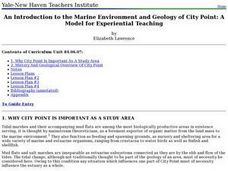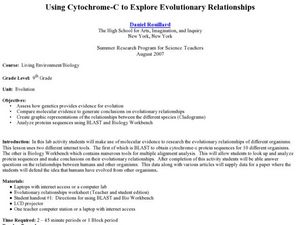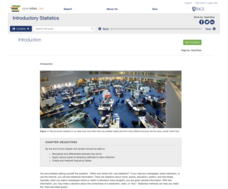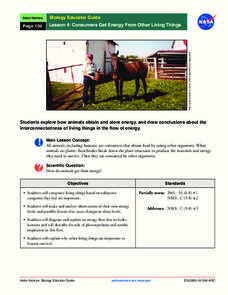Towson University
Mystery Disease
How did scientists determine the cause of illness before technology? Science scholars play the role of medical researcher in an engaging guided inquiry activity. Using observations, technical reading, and Punnett squares, learners...
Worchester Polytechnic Institute
Interactive Laboratory Activities for Secondary Education
Do you think the lab smells like rotten eggs? Sorry to hear about your sulfering. A set of five experiments covers many different topics including seasons, gravity, food, precipitation, and photosynthesis. Though not presented as a...
Curated OER
Using Plant Pigments to Link a Suspect to a Crime
Students use chromatography to separate plant pigments collected from a fictitious crime scene and suspects. They compare the Rf values of the plant pigments to determine whether the plant pigments found on any of the suspects match the...
Curated OER
Using a Controlled Experiment to Identify Two Unknown Plasmids
Student demonstrate knowledge of recombinant DNA techniques (restriction enzyme digest, gel electrophoresis, and staining gel). They demonstrate skills needed to complete a gel electrophoresis and interpret a stained gel. Pupils solve...
Curated OER
Honesty and Ethics in the Science Lab
Students complete a variety of lab and discussion activities as they are introduced to ethics and honest lab practices. They perform various biology, chemistry, or physics labs which test their ethical lab practices.
Serendip
Genetic Engineering Challenge – How Can Scientists Develop a Type of Rice That Could Prevent Vitamin A Deficiency?
Brown rice contains vitamins B and E, while white rice lasts longer in storage. The availability of rice around the world makes it a great candidate for genetic engineering. Scholars apply their knowledge of genetic engineering to solve...
Curated OER
Introduction to Measuring the Forest
Students investigate how much wood is in a forest. In this forestry lesson, students calculate how much usable wood comes from the forest. They will read, Sizing Things Up from Trees + Me = Forestry, measure firewood piles, and create a...
Curated OER
An Introduction to the Marine Environment and Geology of City Point: A Model for Experiential Teaching
Students begin the lesson by researching the history of City Point, Connecticut. Using a map, they color areas they were asked to find and discuss why the areas are important to the community. As a class, they are shown recent slides...
Curated OER
Introduction to Measurement
Student observes and measures the variability in the length of the forearm and the length of the foot and to test a common belief that the length of the foot is equal to the length of the forearm.
Curated OER
Alcoholic Fermentation in Yeast
Biology classes will bubble with excitement as they complete this assignment. Beginning with an informative overview of cellular respiration and fermentation processes, the highlight comes as an experiment in determining the rate of...
Curated OER
The Great Cafeteria Caper
Learners extract DNA from their own hair roots. They run an electrophoresis gel to examine patterns of their DNA along with standard DNA. The experiment is based on a crime scene scenario.
Curated OER
Investigating Osmosis
A thorough investigation of cell transport is provided when completing the assignment. The first half requires biology class members to answer questions about diffusion and osmosis with the aid of diagrams. Then they fashion an...
Towson University
Case of the Crown Jewels
Can your biology class crack the Case of the Crown Jewels? Junior forensics experts try their hands at DNA restriction analysis in an exciting lab activity. The lesson introduces the concept of restriction analysis, teaches pipetting and...
Curated OER
Introduction to Scientific Theory
Ninth graders explain how scientists set up investigations. In this scientific process lesson, 9th graders review the principles of the scientific method and use these skills to answer an open-ended question about how to set up a...
Curated OER
Using Cytochrome-C to Explore Evolutionary Relationships
Students analyze protein sequences. In this lesson on determining evolutionary relationships, students use the Internet tools BLAST and Biology Workbench to look at protein sequences. Students will compose an essay that includes their...
Curated OER
Note Taking And Skills And Lab Reports
Middle schoolers perform simple and fun experiments to use the scientific method, take careful notes, and write a lab report. They first make and test a hypothesis about how many drops of water they can fit on the face of a penny and...
Curated OER
Using Blood-Typing to Determine Causes of Death in Surgery Patients
For this simulation activity, young biologists examine blood types to determine whether the death rate in a hospital was caused because of incorrect identification of patient blood types. You will need obtain and follow the procedures of...
Curated OER
Fishy Behavior
Here's a lab that may make you rethink that morning cup of coffee. Biology scholars test the effects of caffeine, alcohol, and nicotine on the behavior of zebrafish through an intriguing experiment. Learners observe fish behavior before...
Curated OER
DNA on Stick
Learners experience a "hands-on" activity to get visual evidence of the physical nature of DNA and the process of DNA purification. They explore one method of chromosomal DNA isolation and DNA extraction.
Curated OER
CELL TRANSFORMATION IN TOBACCO LEAF DISKS
Students work with whole plant material and are not required to measure small quantities, yet they can see evidence of transformed plant cells (plant cells that have genes from bacterial plasmids). This is a laboratory suitable for...
Rice University
Introductory Statistics
Statistically speaking, the content covers several grades. Featuring all of the statistics typically covered in a college-level Statistics course, the expansive content spans from sixth grade on up to high school. Material comes from a...
NASA
Consumers Get Energy From Other Living Things
How do plants and animals get their food? Learn about where energy comes from, how animals store energy, and aerobic respiration, in a lesson that allows scholars to diagram energy flows.
Curated OER
Lab Experiences: The cookbook Translator
Students preview a copy of the lab experience and "cookbook translator" prior to the actual lab experience. They participate in the lab experience and complete the "cookbook translator" for evaluation at the completion of the laboratory...
Cornell Lab of Ornithology
Life In A Nest: Exploring Life Cycles With Bird Cams
Why read about it when you can watch it happen? Bird cams make it possible for learners to experience the life cycle of a bird in real time! An engaging set of lessons provides activities to connect their learning to bird cam...

























